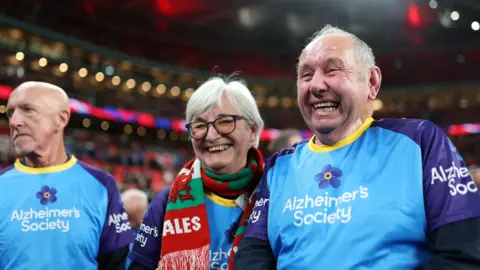Holly Harrison and Harriet HorganBBC Wales

 Getty Images
Getty Images
Twenty-two supporters walked side-by-side with players in place of the traditional child mascots
Wales fans living with dementia walked out alongside players when the side faced England in a friendly at Wembley on Thursday.
Twenty-two supporters walked side-by-side with players in place of the traditional child mascots as part of an initiative involving the Alzheimer's Society.
One of the supporters, lifelong Wales and Cardiff City fan Chris Griffiths - who still attends matches despite his diagnosis - said football had played an important role in his life since his diagnosis.
Wales players also played the second half of the match without their names on their backs, to raise awareness about the brain condition.
Football has played an important role in Chris' life, from playing in local leagues to refereeing youth and adult matches, while his father played for Barry Town and trialled for Arsenal.
Chris described his diagnosis as a "weird thing" to begin with, but described the support he has received as "unbelievable".
"The people around me have been great all of them, even the kids. When I met more people, it got better. Now I feel I can get out to certain places, which is nice," he said.


Chris Griffiths is a lifelong Wales and Cardiff City fan
This includes attending Wales and Cardiff City games with his son and brother, and being actively involved in Cardiff City Foundation's 1927 Club, which supports people living with the illness.
"Football in general has been a big part of his life and I think it helps bond everybody together and gives them something to talk about," said Lee Griffiths, Chris' son.
He said that, despite the diagnosis, his father was "still a lot of fun".
"And we're really grateful for the experience he's going to have up in Wembley," he said.

 FAW
FAW
Wales players played the second half of the match without their names on the backs of their shirts, a symbolic act highlighting memory loss, one of the most common symptoms of dementia
As well as the mascots joining both squads for the national anthems, after half-time Wales players returned to the pitch without their names on the backs of their shirts, a symbolic act highlighting memory loss, one of the most common symptoms of dementia.
The gesture mirrored similar campaigns by England in previous matches partnered with Alzheimer's Society.

 Getty Images
Getty Images
"By walking out with fans living with dementia, we send a clear message that nobody should face dementia alone," said Noel Mooney, Football Association of Wales chief executive.
"It takes a united team, on and off the pitch, to provide the care, compassion and understanding needed to support those affected by this condition."
Alex Hyde-Smith, chief marketing officer at Alzheimer's Society, said it was a "historic night providing a special moment for our mascots and their families", highlighting the importance of people coming together to tackle the illness.
What is dementia and is it the same as Alzheimer's?
Dementia is a symptom found in many diseases of the brain.
Memory loss is the most common symptom, particularly the struggle to remember recent events.
Others can include changes to behaviour, mood and personality, becoming lost in familiar places, or being unable to find the right word in a conversation.
It can reach the point where people do not know they need to eat or drink.
Alzheimer's is by far the most common of the diseases that cause dementia.

 5 hours ago
1
5 hours ago
1

















































